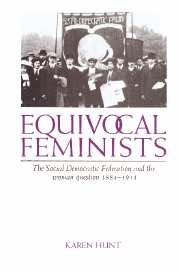Book contents
- Frontmatter
- Contents
- Acknowledgements
- Introduction
- Part 1 The woman question: the theory
- Part 2 The SDF and the woman question: the theory and practice of the party on aspects of the woman question
- Part 3 Women and the SDF: the practical implications of the SDF's understanding of the woman question
- Conclusion
- Appendices
- Bibliography
- Index
Introduction
Published online by Cambridge University Press: 14 January 2010
- Frontmatter
- Contents
- Acknowledgements
- Introduction
- Part 1 The woman question: the theory
- Part 2 The SDF and the woman question: the theory and practice of the party on aspects of the woman question
- Part 3 Women and the SDF: the practical implications of the SDF's understanding of the woman question
- Conclusion
- Appendices
- Bibliography
- Index
Summary
The woman question has always haunted socialist politics. Today, the policy of women-only shortlists unsettles many Labour Party members. At the same time, many women are concerned by the apparently unbridgeable gap between socialist rhetoric on sexual equality and the priority given to women's issues in practice. It was ever thus. Certainly the woman question was a contentious issue in the nineteenth and early twentieth centuries.
What was ‘the woman question’? It embraced all aspects of the relations between the sexes in the public sphere – including work and politics – and those in the private sphere – including the family, marriage and sexuality. The woman question was also where the concepts of ‘the public’ and ‘the private’ were analysed. But as a contentious issue which concerned the nature of women's oppression, the woman question encompassed a range of perspectives. This book is concerned with the ways in which a particular group of socialists – the Social Democratic Federation – understood ‘woman’ in its theory and through its practice.
For socialists the woman question was often reduced to the phrase ‘sex versus class’. Their purpose was to identify what constituted the denning feature of an individual woman's identity and hence her collective loyalty. The crucial question was where should working-class women put their hopes and commitment – with their class and therefore to socialism, or with their sex and therefore to feminism.
- Type
- Chapter
- Information
- Equivocal FeministsThe Social Democratic Federation and the Woman Question 1884–1911, pp. 1 - 20Publisher: Cambridge University PressPrint publication year: 1996
- 3
- Cited by

